Peter MALONE
Saturday, 09 October 2021 13:01
Wake Up/ Awake
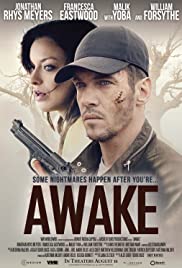
WAKE UP/ AWAKE
US, 2019, 92 minutes, Colour.
Jonathan Rhys Meyers, William Forsythe, Francesca Eastwood, Malik Yoba, James Austin Kerr.
Aleksander Chernyaev.
This is an amnesia story. Jonathan Rhys Meyers plays a young man who is menaced on the Highway, forced off, crashing, injuries, waking up in hospital with amnesia. But, there is a body of a dead woman in the boot of his car.
There is a serial killer about and he becomes the main suspect. However, he escapes, is helped by the nurse at the hospital who is sympathetic (Francesca Eastwood) who takes him to a friend’s house, helping him in his recovery, but given evidence that he is the killer.
Also involved is the local sheriff, William Forsythe, whose wife has died in violent circumstances, his sportsmen son living at home. A detective friend of the sheriff becomes involved in the pursuit.
There is a good twist in the final revelation of who the young man is – leading to a further twist as to who the killer is.
Maybe there are holes in the plot and some of the action might seem far-fetched. But, while it is on the screen, and with the twists, it is interesting and entertaining.
1. The title? Injury, coma, amnesia?
2. The American town, homes, streets, hospitals, the open road? The musical score?
3. The initial driving, the open spaces and roads, the driver, the pursuing car, the push, the crash, injuries, the later discovery of the car, the patient taken to hospital, injuries, treatment, waking, amnesia?
4. Roger, the police, at home, his son in sport? Frank, detective work, working with Roger? Their friendship? The beginning of the inquiries, interrogations, the murders, the photos and body in the car, suspicions of the injured man?
5. The investigations, circumstances of the murders, the floral crown, the bodies? The body discovered in the trunk of the car?
6. Diana, nurse, compassion, believing him? His behaviour, his ability, the escape, her car? Driving, his collapse? Her taking him to her friend? His suspicions? Yet cooperating? Dismayed at the evidence against him?
7. The mystery of the injured man, his skills in effecting his escape? The evidence against him?
8. Memory gradually coming back, the men attacking him and killing Diana’s friend? His going to Oliver’s house? Hitting him, escaping?
9. The continued pursuit, Frank and his being desperate? Roger and his work?
10. The man discovering who he was, the audience surprise that he was a detective, that he was investigating the murders?
11. Roger and his story, the death of his wife, his son? Protecting him? Hiring the thugs? The car and the pursuit, expecting the detective to die?
12. The explanations, the detective as an honourable man, the friendship with Roger, another son, friendship with Oliver? Oliver and his madness? The murders? Roger killing himself?
Published in Movie Reviews
Published in
Movie Reviews
Saturday, 09 October 2021 13:01
Countdown/ 2019
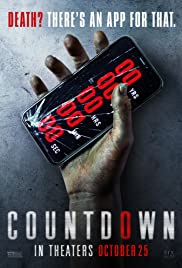
COUNTDOWN
US, 2019, 90 minutes, Colour.
Elizabeth Lail, Jordan Calloway, Talitha Bateman, Tichina Arnold, P.J.Byrne, Peter Facinelli.
Directed by Justin Dec.
Horror fans who watch this film may be quite – app-rehensive!
There is an increasing number of horror films which rely on the intricacies of social media, computers, phones, apps.
Young adults at a party are introduced to an app which indicates when the owner of the phone will die, having a chart on the homepage indicating how much time the owner has left. To bring home the point, a young woman finds she has very little time to live, avoids driving home with her boyfriend who has been drinking, gets out of the car. He crashes and a tree branch goes through the windscreen into the place where she might have been sitting. However, as the time comes, there is a sinister presence and she dies.
That is by way of prologue.
The main action of the film concerns Quinn, a young nurse at the hospital where the boyfriend is taken for surgery. However, he avoids the surgery and finishes up being menaced at his time of death by a sinister figure, of his girlfriend.
There are complications of the hospital, especially an arrogant doctor who harasses and molests other nurses. And, Quinn has a sister, with whom she clashes, because of the responsibility of her going out without her mother’s knowledge, her mother going out to find her and being killed by a car.
And, there are even more complications when Quinn and her sister and some friends consult a priest (an unlikely character) who tries to get some help but, with impending time limits, the death of a young man who was responsible for the death of his brother, they consult another priest (even less likely to have got through the seminary!) who fills them in on various curses and demonic characters.
What to do? Hack the phone, break the codes? Have someone die before their time and so release the others…?
This is popular stuff, American horror, building up to a climax – and, of course, for the survivors of the crisis, the automatic downloading of an update of the death app!
1. Popular horror film? Hauntings? Deaths?
2. The basic idea, the app about death, time limits, death predictions? Horror theme about the popularity of apps?
3. The opening, Courtney, the party, the game, the dares, her reluctance, the downloading of the app? The prediction of her death? Not wanting travel with her boyfriend, the crash and his death, the tree in her seat? Her going home, fears, her death?
4. The boyfriend going to the hospital, Queen and her work in the hospital, harassed by Dr Sullivan and her resistance? The beginning of her career? Learning about the app, her disbelief? The discussions about amongst the staff? The app downloading? Evan, skipping his surgery, being killed by a monstrous presence?
5. Quinn, strong character, the death of her mother, Quinn going out, deceiving her mother about the outing, Jordan and the truth? Their mother’s death? The young man, the story about his brother, the app, his death?
6. Quinn, her fears for her sister, the clashes, the blame, the reconciliation? The threat to Jordan?
7. Trying to adjust the app? The work to break the codes? Derek, friendship, hacking the codes?
8. The visit to the priest, his advice? The crisis, going to Father John? A credible priest/not? Young, comic character, advice, yet his knowing about curses and the daemon?
9. The buildup to the crisis, the threat to Jordan, the idea if somebody dies before their time, releasing the curse?
10. Dr Sullivan, his behaviour, molesting the nurses, his death?
11. Quinn, wanting to save Jordan, confronting the Demon, her mother? The attack ahead of the predicted death time – the initials on her arm, the injecting of the medical counterbalance, reviving?
12. The growing melodrama? Quinn protecting Jordan, vengeance for Dr Sullivan? The changing times, the new phones, the updated app?
13. The two sisters, with their father, visiting the grave?
14. And the continued threats and updates?
Published in Movie Reviews
Published in
Movie Reviews
Saturday, 09 October 2021 13:01
Ghost World
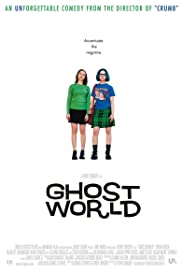
GHOST WORLD
US, 2001, 112 minutes, Colour.
Thora Birch, Scarlett Johansson, Steve Buscemi, Brad Renfro, Ilieana Douglas, Bob Balaban, Stacey Travis.
Directed by Terry Zwigoff.
While watching this film about two high school girls who graduate, see themselves as superior to everyone else and then try to fend for themselves, I kept wondering why it was called 'Ghost World'. The world portrayed seemed to be modern Los Angeles which one could hardly call ghostly. And the characters themselves seemed solidly real. Perhaps it was because the two girls didn't feel that they belonged to the real world. There must be something in a film when you spend time trying to fathom what the title means.
Next step was to the Media Kit. And an answer.
Perhaps it should be said first that the author of the material on which the film was based, Daniel Clowes, is a writer of comic books. This is his answer: 'I was once walking around Chicago in a really bad neighbourhood and in the midst of some really illegible graffiti, somebody had written 'Ghost World'. I thought at that time there was really something sort of beautiful about that - it struck me as having a really evocative, poetic quality. It had so many levels of meaning to me. The America we live in is disappearing, bulldozed under our feet and constantly rehabbed and remodelled. It also refers more personally to the characters and the friendships that they've lost'.
Yes. I think he's right. Documentary maker, Terry Zwigoff, was fascinated by Clowes' comic books and had himself made an award-winning film, Crumb, about cartoonist and illustrator, Robert Crumb. Zwigoff and Clowes worked together on the screenplay. They wanted to bring to life Enid and Rebecca, the comic books' two friends, who are united in mockery and disdain of everyone and everything they think beneath them. Enid, the leader, has set up a man she considers a 'loser' who has put an ad in the personals column. She humiliates him. But, as she watches him, she gets to know him, feel sorry for him and then learns something about life from him. Rebecca is more practical, is able to hold down a job, does not always understand Enid's malicious behaviour. When they finally manage to get their apartment to room together, everything has changed. They have to face adulthood in the real, mall-ridden, fast-food outlet, kitsch communities of Los Angeles.
Because of the girl's behaviour, especially that of Enid, the action is always slightly off kilter and requires constant attention by the audience to assess whether the girls are changing or not. What keeps audience attention are the performances. Thora Birch (the daughter of the house in American Beauty) is expertly alarming as the unpredictable Enid. Scarlett Johansson (the girl in The Horse Whisperer) is fine as Rebecca. Also well worth seeing is the performance of Steve Buscemi as Seymour, the loser LP collector, who is both attracted to and bewildered by Enid.
So many films about teenagers coming out of the United States are raucous sex comedies of the American Pie variety. Ghost World is the opposite, a serious look at teenage alienation and wilfulness. Obviously, it has a lot of the behaviour that parents and adults find exasperating. But, in its comic book way, it asks us to respond emotionally to the characters and to think about them.
1. The title? The writer’s comment about the graffiti and the American city as a ghost world?
2. The American city, Los Angeles style, streets, diners, apartments, art school…? The musical score and songs?
3. The basis in a comic book, amplifying the comics, characters, situations, dialogue?
4. The tone of the story, of Enid and Rebecca, sardonic, superior, mockery, teenage attitudes, possibilities for change?
5. Edited Rebecca, the performances, teenage, having completed school, the celebration of the graduation, the two girls above the celebration, the mockery of the speaker and her religious fervour? Prospects in life, find an apartment, share? Jobs? For the summer?
6. Enid, her age, Thora Birch’s performance, her look, severe, the glasses, the black hair, her dresses? Her comments? Her hopes, the later sequence with her father and his weakness? Her friendship with Rebecca, together, their observations on a wide range of people?
7. Enid going to art school, the students, the enthusiasm of the teacher, comments, getting the picture of the chicken, the past attitude of the Coon chicken franchise, the races? The exhibition, the comments of the teacher, putting it on show, borrowing it from Seymour? The reaction of the school, the teacher, failing Enid, discussions with the teacher, regrets?
8. The situation with Seymour? Seeing the advertisement, prank, the phone call, the date, the two girls with Josh watching him, ridiculing him? Watching him selling the LPs? Enid buying one? Going to his home, his collection? Seymour and his life, going to a psychologist, working as a manager in the chicken franchise business? Dana as the recipient of his calls? Possibilities in his life?
9. Enid, visiting Seymour, the time together, talk, the records, sharing, getting him to ring again, yet her jealousy, the visits, Dana’s reaction, drinking with him, the one night together, the effect on each of them?
10. Seymour, going to see Dana, breaking up? The visit to the psychologist? Getting his life in order?
11. Rebecca, shopping, with the boys, on a different path from Enid? Josh and his place, ‘Weird’, the break between the two girls?
12. Norman, the old man, sitting at the bus, the bus going nowhere? Then its arrival, Norman going? Enid going to the bus – going where? (The writer and his mentioning that a number of people interpreted this is suicide?)
Published in Movie Reviews
Published in
Movie Reviews
Saturday, 09 October 2021 13:01
Beverly Hills Cop 3
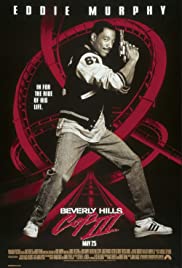
BEVERLY HILLS COP III
US, 1994, 104 minutes, Colour.
Eddie Murphy, Judge Reinhold, Hector Elizondo, Timothy Carhart, John Saxon, Teresa Randle, Stephen Mc Hattie, Alan Young. Cameos: George Lucas, Martha Coolidge, George Schaffer, Joe Dante, Babette Schroeder, Peter Medak.
Directed by John Landis.
On its release in 1994, this sequel received a critical drubbing, comparisons with the original film.
However, it is entertaining in its way, relying on the enthusiasm and sometimes charm of Eddie Murphy, cheeky, exuberant, going into action, good detection, cheerful hero. He is joined again by Judge Reinhold from the original film. This time Hector Elizondo steps in as the complimentary police officer.
While the film starts with action in Detroit, the pursuit of a truck, lots of shooting, the death of the police supervisor and his funeral, the clue is given that the Los Angeles Wonderland Park needs investigation. Axel Foley goes to Los Angeles, meets up with Billy, is introduced to John Flint (Hector Elizondo), spends a lot of time at the theme park – with lots of rides and characters to entertain the cinema audience.
Foley uncovers the criminal, and there are lots of confrontations, shootouts – especially the end with a super weapon provided by the very camp Serge (Bronson Pinchot). There are intimations of romance with Teresa Randle as top technician control for the rides – with Alien Attack demonstrated and used in the finale.
John Saxon appears as another criminal but Timothy Carhart is the mastermind. Stephen Mc Hattie also appears as a federal investigator.
The blend of comedy and action, relying on Eddie Murphy’s presence, and, for curiosity, quite a number of producers and directors have cameo roles, including George Lucas as a disappointed customer at Wonderland.
Direction is by John Landis, director of many comedies, working with Eddie Murphy in Coming to America and Training Places..
1. The popularity of the original? Sequels?
2. Eddie Murphy, his embodiment of the detective, Axel Foley? The past adventures? Collaboration with Billy? Personality, Eddie Murphy alive! Humour, cheekiness, action, detection?
3. The opening in Detroit, the stakeout, the cars and crashes, the attack, the weaponry, the truck and the killing of all the mechanics? De Wald and his ruthlessness? Foley and pursuit? The death of the supervisor and the pathos? The intervention of the FBI? The funeral and the comforting of the dead man’s wife?
4. Examining the evidence, the indication of Los Angeles and Wonderland? Advised to keep out of the investigation, going to Los Angeles, meeting Billy again, his promotion, his office? The introduction to Flint? The introduction to the manager of Wonderland?
5. The visuals of Wonderland, audience enjoyment, the variety of rides, characters? The ride and the mechanical interruption, Foley leaping from cabin to cabin, the rescue of the children? Alien Attack?
6. His seeing the entrance, the tunnels, the investigation, Sanderson and his control? Meeting De Wald? The focus, the pursuits of chases, the violence, shooting?
7. The encounter with Uncle Dave, the image of Wonderland, the conversations, the meeting with Foley, his being shot, taken to hospital, the recovery? Foley blamed for the attack, people watching television, in the bar, blaming him?
8. Janice, meeting, her control of the technology, the humour of the Alien Attack? Its later use in the in the attack on the thugs? The romantic possibilities? Janice and Billy caught in the cold room, the escape, their participating in the fight?
9. Serge, the past, comedy, the camp manner, the pretty weapons? The demonstration – and the preparation for the later use, the misfires at first, success?
10. The discovery of the printing press, the money, forgeries, the defence against the police and the Wonderland cash?
11. Foley and his continued attacks on De Wald, being fobbed off? The buildup to the ultimate confrontation, throughout Wonderland, Sanderson arrested, De Wald and his death?
The irony of the agent being part of the gang?
12. The happy ending, Uncle Dave restored, reputations saved?
Published in Movie Reviews
Published in
Movie Reviews
Saturday, 09 October 2021 13:01
Ask Dr Ruth
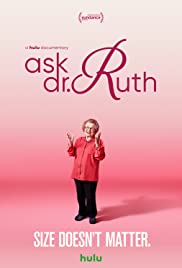
ASK DR RUTH
US, 2019, 100 minutes Colour.
Directed by Ryan White.
Ask Dr Ruth – and they did; and they still do.
This benign portrait of the sex therapist celebrity, Dr Ruth Westheimer, culminates in a celebration of her 90th birthday. There are quite a number of teasers during the opening credits, clips of Dr Ruth from radio and television, especially in the 1980s when she made her breakthrough. The questions are provocative. Dr Ruth’s stances, at least at that time, were also provocative. She was very frank and direct in her opinions, in her language, in encouraging people to speak openly and without embarrassment about sexual issues.
But, the film is also the story of story of her life. And, quite a story it is, especially in her early years.
She was born Karola Ruth Siegel in Frankfurt, Germany, in 1928. She came from an Orthodox Jewish family. When she was 10, and her father arrested and sent to a labour camp, her parents decided that she should leave for Switzerland, for safety and education. She spent the war years in an orphanage, the orphans looked down on, the girls intended to be housemaids while the boys had an education. This had a strong effect on her. Zeal for education became all-consuming.
Her early post-war years took her to Israel and sniper duty. Eventually, she set sail for the United States where she found a home, married three times, had children, studying at Cornell and Columbia, became involved in Family Planning movements, eventually being invited to speak on radio when some of her colleagues were reluctant. She was an instant hit.
At 4’7�, diminutive but an outgoing energetic dynamo, she fielded questions on sexual issues, was guest on many television shows (many clips in this documentary), appeared on some television series, was feted around the United States – as she still is.
While there are many clips from the past, there are also sequences where she searches for the records of her parents’ death, visits Switzerland again, visits Israel again, meets old friends from the past who throw light on her life in those days and the impression she made. There are several interview pieces with her children and grandchildren.
One of the most interesting features of the film is animation, quite striking, to illustrate her early years, the situations and the characters, with voice-over from her diaries.
Some criticisms of Dr Ruth are voiced, especially that she was reckless in giving free information and advice based on limited evidence from enquirers. And, not everybody would agree on her stances on sexual issues, on abortion. However, she has the courage of her convictions, speaks out, and has contributed to, at least in the United States, a less inhibited approach to issues of sexuality and public discussion.
As a character, she is lively and generally infectious.
Published in Movie Reviews
Published in
Movie Reviews
Saturday, 09 October 2021 13:01
Knives Out
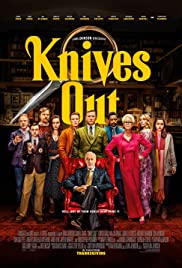
KNIVES OUT
US, 2019, 130 minutes, Colour.
Daniel Craig, Chris Evans, Ana de Armas, Jamie Lee Curtis, Michael Shannon, Don Johnson, Toni Collette, La Keith Stanfield, Christopher Plummer, Katherine Langford, Jaeden Martel, Riki Lindholme, Edi Patterson, Frank Oz, K. Callan, M. Emmett Walsh, Joseph Gordon- Levitt.
Directed by Rian Johnson.
Of course everybody will say Agatha Christie. And so, here is her name – an acknowledgement of her books being the archetypes of popular 20th century whodunnits (enhanced by the vast number of film and television versions) and her continuing influence in the 21st-century.
So, there will be a death, an alleged suicide, questions of foul play. And we are shown this at the beginning of the film, Christopher Plummer as Harlan Thromby, dead after a party for his 85th birthday. Fortunately, for us, there are quite a number of flashbacks so Christopher Plummer gets the opportunity to create his character, indicating various motives for his relatives wanting his death. He is a famous crime writer and his books are bestsellers.
While detectives come to investigate the death, an unusual private detective also turns up, hired, paid in cash anonymously. He is Benoit Blanc, a gentleman from the American south, played by Daniel Craig, southern accent and all.
And so, he interviews the relatives, giving us all an opportunity to get our minds working, and suspicions aroused, wondering if the death was suicide or murder. And, as usual, the suspects are rather unpleasant, the murdered man’s haughty self-made daughter (Jamie Lee Curtis) and her smiling yet fickle husband (Don Johnson) and their arrogant son (Chris Evans). The murdered man also had a son (Michael Shannon in a rather subdued role), his wife and young son. Rounding out the suspects is a daughter-in-law and her daughter (Toni Collette and Katherine Langford) with money problems for education.
Continually present and with more of a back story is the caregiver, Marta (Ana de Armas). Very early in the piece, with some complexity in the events concerning the murdered man, we realise that Marta is not guilty but has some worrying details which she conceals (although the writer gives her a psychosomatic illness – that she actually vomits when she doesn’t tell the truth!, Which happens on several occasions).
And, of course, there is the heightened melodrama of the reading of the will!
Twists and turns, eccentric investigation, another murder. For audiences who are automatically suspicious in confronting whodunnits, the villain may not be too hard to spot. Probably the best question towards the end of the film is howdunnit.
Writer-director, Rian Johnson, made a number of small dramas including Brick and Looper, but then moved on to writing and directing Star Wars, Episode VIII, the Last Jedi. There are also prospects for him to write further Star Wars episodes.
Agatha Christie’s murder mysteries are not profound explorations of human nature – though the explanations of human nature, evil and malice are to the fore. And, this is what Knives Out does as well.
1. The popularity of the whodunnit? Old style and Agatha Christie? New style and Agatha Christie?
2. The Massachusetts setting, the mansion, other homes, city offices, roads, the interiors of the mansion? The musical score?
3. The characters, the introductions with names, each has a suspect, the development of motives?
4. The party, Harlan and his 85th birthday, all the relatives coming, the events over the night, comings and goings, the reconstruction, Ransom and his leaving, the discussions, the boy in the toilet, online, Marta and her presence, the carer? Her going upstairs, the game with Harlan, the crash, the medication, the mix-up? The collapse, the 911 phone call or not? Harlan’s plot to save Marta blame, her getting out, climbing, the car, the return, seen by the grandmother? Harlan slitting his throat?
5. Blanc, Daniel Craig, his southern accent, his style, coming with the two police investigators, the interrogations? Meeting all the characters, suspects? The issue of Harlan and suicide or foul play? The theories? His being hired, anonymous, the money? The discussions with Marta, relying on her, the reaction of the others? The mystery of the case, a doughnut within a doughnut – and the revelation that he had seen the spot of blood on Marta’s shoe?
6. Marta and her role, caregiver, her mother illegal in the country, the threats? With Harlan, the discussions with him, her knowing the family secrets? Her standing by the party? Upstairs, watching and episode of Murder She Wrote? Her not being allowed to the funeral? The further interrogations? The discussions with Meg, the stash of drugs? Her wanting to tell the truth, with Ransom, explanations, confession, going to the reading of the will, everything left to her, her reaction? The threats to her? The family shock? The different ways in which they tried to put pressure on Marta? Her going to get the autopsy report, the poison, Fran, discovering the body, her blackmail, collapse, Marta saving her? Vindication at the end?
7. Harlan, his success as a writer, murder mysteries, plots, clues? Issues of money? His will, cutting everyone off? The flashbacks? His discussions with each and his reasons? Relying on Marta, his death, thinking he was poisoned?
8. Linda and Richard, hard, business, Ransom as their son, Richard and the revelation of his affair, his reactions, the irony of the invisible writing and Linda reading it?
9. Walt, weak, his wife, son, inheriting the company, seen as a loser?
10. Joni, the sister-in-law, her comments and products? Meg and the education, siphoning off the money?
11. Fran, discovering the body, the later blackmail, her death?
12. Ransom, his setting up the situation, overheard, changing the medicine, disappearing? His return, the wheel, cavalier, with Marta, supporting her, the setup and the threats to her? His arrest?
13. The final scene, Marta on the balcony, the others wondering about their money? The future?
Published in Movie Reviews
Published in
Movie Reviews
Saturday, 09 October 2021 13:01
Good Liar, The
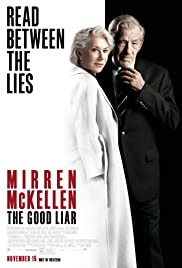
THE GOOD LIAR
UK, 2019, 109 minutes, Colour.
Helen Mirren, Ian Mc Kellen, Russell Tovey, Jim Carter, Mark Lewis Jones.
Directed by Bill Condon.
Surnames, in big letters, as large as the letters for the title, Mirren and Mc Kellen, indicate that this is a film not for young audiences who may or may not know the stars, but from an older audience who appreciate the long careers and the performances.
And this is certainly the case here. Some audiences may consider the plot has its light moments, or its obvious moments, or anticipated something of the twists. But, there will probably be unanimity in the quality of the performances and the enjoyment of watching the two stars at work, a great deal of subtlety, the moments of interconnectedness.
With the title, and the initial information given about Roy Courtney, we are in no doubt that he is a villain. As we go through the film, he has no redeeming features, is completely reprehensible (and, eventually, more so than we might have anticipated). There might be a moment of sympathy as we see him finally, but that probably evaporates also.
Roy Courtney is Ian Mc Kellen. In the last 20 years, Ian Mc Kellen has had great opportunities for showing that he can be a villain on screen (sometimes obliterated by his sympathetic presence as Gandalf), but Bryan singer was able to draw the evil and sinister out of him as Magneto in several of the Ex-Men’s? stories but, relevant to this film is his most sinister, ex-Nazi character in Apt Pupil. This time his directed by Bill Condon, writer and Dir of musicals and dramas, who worked with McKellen? in Gods and Monsters, where Mc Kellen played the famous film director (Frankenstein), James Whale.
By contrast, Helen Mirren is charmingly sedate for most of the film, a widow, enchanted by the conman, his making her come alive. Of course, it is in the latter part of the film, that there is more complexity and her character, where she is able to control a situation, simply sitting in a chair with a threatening iPad in her hand.
Much of the latter part of the film is unexpected, enjoyably so. There are some significant sequences in Berlin, touches of the touristic, touches of the mysterious. But, it is the mysterious, based on the increasingly monstrous behaviour of Roy Courtney, that audiences can look forward to and enjoy.
The cast is comparatively small – although there are several characters, British financiers who want to be involved in a shady deal, Russian financiers who are not what they seem, seems exposing what a schema Roy Courtney is. And he is aided and abetted by his crony, posing as a financial adviser, Vincent, with Jim Carter having time off for his years of long service at Downton Abbey. Russell Tovey appears as Betty McLeish’s? grandson who has her interests at heart.
This is the kind of film, from Britain (though with an American director) which settles us in London, has an excursion to Berlin, has its romantic moments, at its ugly violent moments, has its satisfactory emotional ending (if one is after justice) and is more than enhanced by two superb performances.
1. The title? As applied to Roy? Ultimately, to Betty?
2. The London settings, homes, restaurants, shops, the streets? The excursion to Berlin, the building, the city side, memories of the war? The flashbacks, to Germany in 1943, to 1948? The musical score?
3. The introduction to Roy, Ian Mc Kellen’s presence, his working with Vincent, his plans, frauds, the Internet and his image, his name, telling Betty the truth? The date, the meal, the talk? His assessing her? The plan to swindle her? The further outings, her enjoying his company? Stephen as her grandson, his reactions? Her happiness with Roy, intimations of her illness, her wealth,? Holiday to Berlin, going back home and happy there?
4. Roy, his forwards, the two British men in their investment, the setup, the performance, Vincent presiding, the two Russians, the insult, their walking out, the return, greater investment? The staging of the raid, the British men fleeing? The irony of the Sherrard, the men as Russians, as butchers? The later confrontation with Roy and demanding the money? Roy and his cunning, the pursuit, the death and the underground?
5. Berlin, the visit, Stephen, his study, research, discovering Roy’s identity? The confrontation, Roy and his explanation of what it happened, 1948, the mission, Hands talk to a UB, the confrontation in the apartment, the shops, the German’s death, Roy taking over his identity? A new personality? The return to England, decades of success as Roy Courtney?
6. The plan, sweet-talking Betty, the plan to combine the accounts, Vincent presiding, Vincent in himself, challenged by Roy, saying that he was in on the fraud? Presiding? The transaction? Betty and her reaction, Roy’s reaction? The irony of the getting to Vincent?
7. The story of his son, Roy going to meeting, taking the iPad, at the hotel, seeing that it was gone, his return, Betty confronting him in the empty house?
8. Betty, calm, with the iPad, cancelling the money? The flashbacks to her past, the girl, her sisters, Heinz and his teaching English, aged 15, trusted by their father, the attempted rape of Lily (the symbolism of the password of lilies)? His smooth talk with the family, his reporting them to the Nazis, the arrest?
9. The role of Stephen, his partner, the company? Helping Betty, security? The confrontation with Roy, the attack, his injuries?
10. Roy in care, Vincent’s visit? Betty and her vengeance?
Published in Movie Reviews
Published in
Movie Reviews
Saturday, 09 October 2021 13:01
Little Women/ 2019
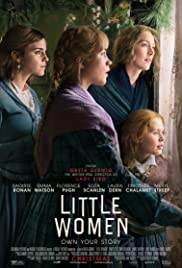
LITTLE WOMEN
US, 2019, 130 minutes, Colour.
Saoirsel Ronan, Emma Watson, Timothee Chalamet, Florence Pugh, Eliza Scanlen, Laura Dern, Tracy Letts, Bob Odenkirk, James Norton, Louis Garell, Chris Cooper, Meryl Streep.
Directed by Greta Gerwig.
Louisa M.Alcott’s Little Women must be one of the most frequently filmed American novels. It is surprising to find yet another so soon. But, here it is, adapted for the screen and directed by Greta Gerwig, who has contributed quite a number of engagingly idiosyncratic performances to such films as Frances Ha, Mistress of America, and who directed the Oscar-nominated film of 2017, Lady Bird.
The star of Lady Bird, the versatile Saoirse Ronan, appears as Josephine March, Jo March, the vigorous heroine of the novel, ambitious to be a writer, limited by her post-Civil War surroundings, devoted to her family, a forerunner of the 20th century independent woman. She makes quite a contrast with her three sisters, the more domesticated Meg (Emma Watson, more sweetness and light than her energetic Hermione in the Harry Potter series), the more ambitious and provocative Amy (Florence Pugh, a strong female presence in Lady Macbeth, Little Drummer Girl, Fighting with my Family), and the youngest, Beth, plagued with ill-health (Eliza Scanlon).
Perhaps surprisingly, Marmee is played with quite some vigour and energy by Laura Dern (a tall presence with Soairse Ronan looking tall and thin, credible as her daughter). This time Father is mostly absent at the Civil War and its aftermath (Bob Odenkirk). And, of course, we have high expectations for the severe and demanding Aunt March – and are rewarded by her being played by Meryl Streep (but we wouldn’t have minded having her in more scenes). Then there are other neighbours, Laurie (Timothee Chalamet), devoted to Jo; his grandfather Mr Laurence (Chris Cooper) and the tutor, Mr Brook (James Norton). And, for Professor Baer, Louis Garell has been brought from France.
No complaints about the effective cast.
What makes this version of Little Women rather different is that in its telling, unlike the straightforward narratives in the past films and television series, it moves somewhat in reverse. It begins, more or less, at the end of the story and goes back and forth in extensive flashbacks. What might make it confusing to those not familiar with the story, is that the relationship between Jo and Laurie goes through enthusiasms and disappointments but only later are we shown the time that he proposed to her. We also see scenes of the marriage between Meg and John Brook, only later seeing the exhilaration of the wedding sequence.
This means that the screenplay keeps us on our toes, re-assessing various episodes as we see more developments as well as reverting to the past.
The film does create the happy atmosphere of the March household. But attention is given to the key sequence where Amy is not allowed to go to the dance and, spitefully, burns Joe’s manuscript – but, we have already seen the later episodes where Amy accompanies Aunt March to Europe and encounters Laurie there.
And, more attention is given to Jo’s visits to the publisher, an acerbic Mr Dashwood (Tracy Letts) who is a demanding editor, trapped in his times where only happy endings are permitted, a happy ending being where the female character finishes married!
Which means that there is a lot of reflection on the 19th century but some judgements made in the retrospect of the 20th and centuries, the role of family, the role of women, assertiveness for women, sympathetic and supportive men.
Because of the popularity of Little Women, it may not be too long before there is yet another version to entertain as well is to tantalise.
1. The 21st century version of the popular novel? The status of the novel, in the United States? Worldwide?
2. Concord Massachusetts, the 19th century? The background of the Civil War? Family life, homes, neighbours? Contrast with Europe and travel? The sequences in New York City, the boarding house, the publisher’s office? The musical score?
3. The strong cast?
4. The storytelling in reverse, sequences in New York City, the range of flashbacks? Yet the order of the flashbacks in terms of time? Sequences of relationships – and then later the background of the relationships? The effect, audiences supplying their knowledge of the story?
5. Little Women as Jo’s story? The second daughter, her relationship with the other girls? Seen in New York City, her story, going to the publisher, the discussion, talking about her friend the writer, the publisher reading it, his comments, accepting the story, the haggling about the finance, copyright? The boarding house, the presence of Frederick Baer, friendship, his critique of her work, Jo upset?
6. Jo and her relationship with her sisters, the different relationship with each of them, the interactions? Marmee, her presence, strong, love, her work supporting the soldiers, her charity and mission, urging her daughters to give to the poor, the effect on them? Father absent at the war? The different personalities of the sisters, their interactions? At home, loving friendship, the issue of the dance, Jo and her dress, fixing Meg’s dress? Amy wanting to go? Her tantrum and putting Jo’s manuscript in the fire?
7. Meg, the relationship with John? Seeing them as married, the family, being poor, his work as a tutor? Meg tempted to buy the fabric, explaining it to John, his reaction? Her selling it? The older couple, quiet, responsibilities? Yet Meg as young, theatre, the wedding sequence and her happiness, family? John and his solid character?
8. The men in the story, Mr Laurence as the neighbour, friendly, the piano, Beth going to play, his giving it is a gift? His relationship with Laurie?
9. Laurie, his life, with Mr Laurence, his wealth, friendship with Jo, the scenes together, the exhilaration at the beach? Later seeing the scene of rejection? Seeing Laurie in Europe, his attraction towards Amy, sharing with her, the proposal, the marriage, the return home? Jo and her response?
10. Amy, her age, position in the family, a strongly determined young woman, not going to the dance, the manuscript and the fire, being confronted, her being sorry, the effect on Jo and hardening her, Marmee and her intervention? Amy on the ice, falling through the ice, the rescue, Jo being touched? The relationship with Aunt March, her taking Amy to Europe, Jo’s disappointment, Amy and her response to travel, the art, tuition, the possibility of marrying Fred, her refusal? Laurie and his attentions? The marriage and the return?
11. Beth, the youngest, devoted, playing the piano, going to Mr Laurence’s house? The gift of the piano? The scarlet fever, her illness, the family tending her, Jones returned? Amy away? The beach scene in joy? Beth the death?
12. Jo, her writing, telling the story of the family, going to Mr Dashwood and his being pressured by his daughter’s to publish? Issues of copyright, Finance?
13. Meryl Streep’s performance as Aunt March, rich, older, haughty, interfering, her commentary, criticism of Jo, John and Meg’s marriage? Taking Amy to Europe? Approving of Laurie? Her death?
14. The inheritance of the house, transforming it into a school? The whole family participating?
15. Jo, the visit of Professor Baer, the family seeing the relationship, urging Jo to pursue him, catching up with him at the station? A future?
16. The ups and downs of a family, suffering, self-sacrifice, happiness?
Published in Movie Reviews
Published in
Movie Reviews
Saturday, 09 October 2021 13:01
I Still See You
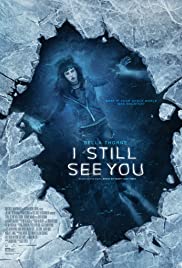
I STILL SEE YOU
US, 2018, 98 minutes, Colour.
Bella Thorne, Richard Harmon, Dermot Mulroney, Amy Price- Francis, Shaun Benson, Louis Herthum, Thomas Elms.
Directed by Scott Spears.
A genre film. In fact, you combined two genres: there is the search for a serial killer; there is your science-fiction setting. No wasted time setting your pace. The introduction to Veronica (Bella Thorne), as a little girl, her parents – and then taken unawares by a shockwave and its devastating effect, more than a touch apocalyptic, on those who lived around Chicago. Then, instantly, 10 years later.
We discover that the apocalyptic was not quite as apocalyptic as we had imagined. We watch Veronica, Ronnie, a wilful and sometimes disturbed teenager, having breakfast with her parents, her father reading the paper at the table, a cup of coffee – his smile and his whispilly dissolving and disappearing. On her way to school, riding her bike, Ronnie sees neighbours watering the garden – and dissolving. She rides into an elderly lady who also dissolves. A group of students at school, chatting, also disappear. So, what is this science-fiction theme?
What is interesting is that the class that Ronnie attends, distracted, given by Mr Bittner, is about these characters who appear and disappear, remnants of their past existence, caught at a particular moment of their lives, to be repeated and repeated over and over again. The device of the screenplay is to tantalise us with the rules about “Rems�, the fact of their survival, a link between life and death and life, their not intervening in human lives or communicating with the living. Just appearing and disappearing. Well, not quite and this leads into the other genre, murders and a search for the murderer.
A mysterious character, Brian, appears when Ronnie is showering and writes “Run� in the steam on her mirror. And, she keeps seeing him, at sports events, and again in her bathroom. What emerges is that Brian is associated with the disappearance of a young woman. Ronnie, and her friend, Kirk, discover more and more, researching newspapers and stories, interviewing people associated with the young woman, discovering that they have been further deaths. And, here come the conventions, the birthdays of the victims occurring on February 29th – as, of course, we discover that this is Ronnie’s birthday and that she is under murderous threat.
Then more on the apocalyptic, Ronnie and Kirk going to Ground Zero of the explosion and shock, a dark abandoned area, the remains of the laboratories and underground tunnels, peopled with a fast for the shockwave, giving science-fiction fans plenty to think about in his explanation of the aims of the project, finding a door between life and death and the afterlife, but opening a far vaster connection than anticipated. The build-up is to melodrama.
Audiences with a more elitist sensibility are prone to poke fun at the inevitability and what they condemn as predictability of the conventions. Genre fans relish the conventions and how they are used and their variations. This film is more inventive concerning shockwaves, deaths, remnants and ghosts, threats and retribution than the average popular show.
1. The title? The remnants, the ghosts? The impact?
2. The settings, the area around Chicago, ordinary lives, homes, school, the roads? The contrast with the underground centre for the shock, the laboratories? Dark and sinister? The bridge in the underpass and the many fish appearances? The lake, the ice? The musical score?
3. The opening, Veronica and her father, the suddenness of the shockwave, the light, the transformation?
4. 10 years passing, Veronica the teenager with her mother, the introduction of the theme of the Rems, her father sitting at the table, dissolving, Ronnie and her way to school, the other apparitions? The teenagers at school and the disappearance? In class, Mr Bittner, the discussion of the Rems, laws, their appearance, not communicating? Ronnie and her project, the discussions with Mr Bittner, his offering advice?
5. Kirk, in class, her following him, the underpass, venturing in, the appearances of the fish? Their increasing? Her working with Kirk? In class, at home?
6. The shower, Brian and his appearance, his writing on the mirror, the threat, seeing him shoot himself, Ronnie seeing him at the sports event? The investigation, with Kirk and the newspapers, the information, the deaths, the murders, consulting the parents, the mystery? The search for the serial killer?
7. Ronnie and her mother, the bond, the mother going for the interview – and its being contrived to get away from the house?
8. Ronnie talking about her father, angry with him before he died? The scenes of her learning to skate? His appearance and smile?
9. The decision to visit the Ground Zero, the crowds, some dead, some alive, finding the doctor responsible for the experiment, his explanation, the aims, a doorway between life and death? The remnants? Ghosts? His killing himself?
10. The discovery that Brian was an assistant? The discovery of Mr Bittner, the photo?
11. February 29th, the birthday? Bittner and his daughter’s death, her being a remnant? Meeting her back, Ronnie is victim?
12. The buildup to the drama, the Panic Room, his going out, confronting Kirk, burying him? Ronnie, her escape, going to the lake, on the lake, Bittner and his attack, her premonitions with her dreams, under the water, surviving, Kirk and the branch, the vision of her father, saving her?
13. A variation on the science fiction theme, the touch of the apocalyptic, the murders and the killer, the blend of the genres? A different kind of science-fiction?
Published in Movie Reviews
Published in
Movie Reviews
Saturday, 09 October 2021 13:01
Wretched, The
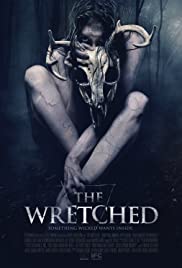
THE WRETCHED
US, 2019, 93 minutes, Colour.
John- Paul Howard, Piper Curda, Jamerson Jones, Azie Tesfai, Zarah Mahler, Kevin Bigley.
Directed by the Pierce Brothers.
The Wretched has a box office distinction – top of the US box office at the time of covid-19 and most of the cinemas in the United States being closed. It had reasonable reviews.
This is a horror film, a film about thousand-year-old witches, taking over children, monstrous and cannibals. However, this description might make it sound more horrifying than the film actually is.
There is a horror prologue, set “35 years ago� indicating eerie houses, babysitters and their fate, mothers and children, takeover by clawing monsters. It is an indicator prologue rather than having any direct connection with characters when the caption comes up “five days ago�.
The central character is Ben (John -Paul Howard), 17 years old. With the focus on him and his experiences, The Wretched seems more of a Young Adult horror film than one for the horror and gore expert fans. They will probably find it rather mild. However, the monster is visualised and there are a number of tense moments.
Ben is living with his mother, his parents ready for a divorce, his father harbourmaster. Ben goes to stay with him doing jobs on the harbour front, meeting a fellow worker, Mallory (Piper Curda) and befriending her and her little sister, Lily. Ben is looked down on by the socialite teenagers but does accept an invitation to a party, trapped into going into the pool, his trunks removed and his being embarrassed in having to run away naked.
He becomes far more involved in watching the family next door, their little boy is one of those involved in harbour activities. Ben (and we) see the mother transformed into a monstrous witch, the little boy disappearing, Ben challenging the father who claims to have no knowledge of having a son. Ben does confide in his father who dismisses his concerns.
Ben becomes more active, goes into the house next door, into the basement, discovers a kind of shrine to some kind of evil power, with its own sign, photos of families with some of the characters scratched out, goes out to rescue Lily but sees her being dragged into the woods and disappearing down a vast hole in a tree trunk.
Of course, Ben decides to rescue the boy and the girl, his father disbelieving (only for his girlfriend to be bewitched) and sending him off with the policeman who has an ominous scar down his neck. This is where the film moves out of the bright sunlight of the earlier part of the film, during the day, on the water, and turns dark and ominous. But, Ben as the hero, confronts the witch, goes down the tree hole…
All’s well that ends well despite his father being injured by the witch, the suggestion that mother and father might get together again, a farewell to Mallory who goes out on a boat with a group of children to train – and the suggestion, of course, that she could be taken over and these children in peril. The Wretched 2 is not impossible!
1. The title? The tone? For a horror film? A monster story? The monster as wretched? The victims?
2. The setting, the sea, boats, the harbour office? The playgrounds for children? The woods in the background? The houses, the interiors, basements? The woods and the monstrous tree? The musical score?
3. The prologue, 35 years earlier, the babysitter, the mother and child, opening the door, the monsters, cannibalism? As a prologue rather than as a link to the characters and events that follow? Five days earlier?
4. A horror film for the young adult audience? Ben, age 17, his parents divorcing, with his mother and phone calls, staying with his father, at the house, his father as harbourmaster, the relationship? His work? The encounter with Mallory? Their friendship, Lily, her sister? The young people on the boat, the taunts, his putting the rubbish on the boat, the bully and fighting? The invitation to the party, in the pool, the trick with his trunks, leaving naked?
5. His relationship with his father, some tensions, his being grounded, his disobedience? His father and his relationship with Sara?
6. Ben, watching the people next door, the family, Nathan and his outings at the harbour? The audience seeing Nathan with his mother, at home with the father?
7. The transformation of the mother, becoming monstrous, Ben looking out the windows, her misshapen body? The effect on her husband? The disappearance of Nathan? Ben confronting the husband, his knowing nothing of his son? Explaining this to his father and his father not believing him? His continued searching and watching? Going to the cellar, the threats, his escapes?
8. Nathan, the disappearance, the concern about Lily, going into the woods, discovering the tree, the vast emptiness?
9. Ben and his researchers about witches, on the Witchipedia?
10. The buildup to the climax, the passing of the five days, Ben and his anxiety, the threats from the wife turned into a monster? The husband and his behaviour? Ben at the tree, the monstrous grabbing at him, his falling hitting his head? Returning home, his father’s anger, the police, Sara and her being transformed into a monster, the drooping flowers, the attack on Ben, the axe, his father discovering it, Sara’s performance?
11. The father sending Ben away with the police officer, the scar on his neck, driving to the water, his trying to drown Ben? The gun, the policeman shooting himself?
12. Ben’s father, his son pleading with him, his decision to go to the house, the basement, the search, upstairs, the husband hanging? The monsters and the attack, his being wounded? Getting out of the house?
13. Mallory, the salt and surrounding the tree, Ben’s going into the hole with the rope, rescuing Nathan, the pursuit by the monster, rescuing Lily? His father arriving just in time to save him?
14. The happy ending? How convincing the seeming final suspicion on Mallory? Would she be taken over by the monster – and the fate of the children with her?
Published in Movie Reviews
Published in
Movie Reviews